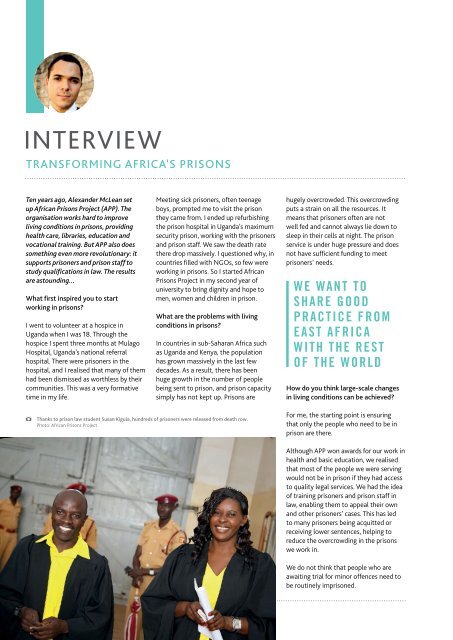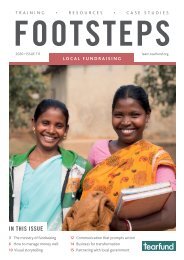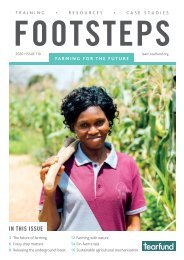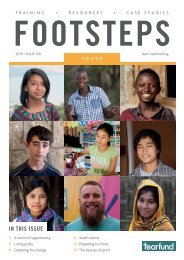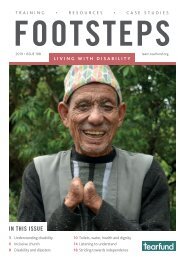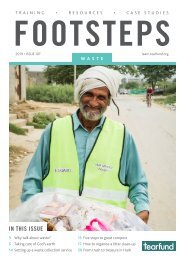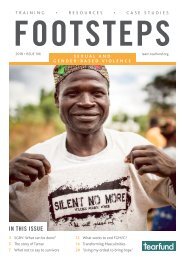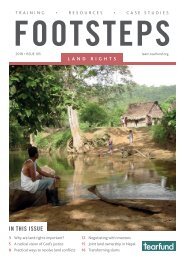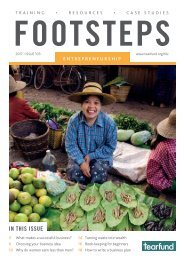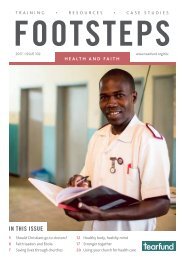Footsteps 104: Prisons
Footsteps 104 features practical tips for getting involved in prison ministry and caring for ex-offenders.
Footsteps 104 features practical tips for getting involved in prison ministry and caring for ex-offenders.
Create successful ePaper yourself
Turn your PDF publications into a flip-book with our unique Google optimized e-Paper software.
INTERVIEW<br />
TRANSFORMING AFRICA’S PRISONS<br />
Ten years ago, Alexander McLean set<br />
up African <strong>Prisons</strong> Project (APP). The<br />
organisation works hard to improve<br />
living conditions in prisons, providing<br />
health care, libraries, education and<br />
vocational training. But APP also does<br />
something even more revolutionary: it<br />
supports prisoners and prison staff to<br />
study qualifications in law. The results<br />
are astounding...<br />
What first inspired you to start<br />
working in prisons?<br />
I went to volunteer at a hospice in<br />
Uganda when I was 18. Through the<br />
hospice I spent three months at Mulago<br />
Hospital, Uganda’s national referral<br />
hospital. There were prisoners in the<br />
hospital, and I realised that many of them<br />
had been dismissed as worthless by their<br />
communities. This was a very formative<br />
time in my life.<br />
Meeting sick prisoners, often teenage<br />
boys, prompted me to visit the prison<br />
they came from. I ended up refurbishing<br />
the prison hospital in Uganda’s maximum<br />
security prison, working with the prisoners<br />
and prison staff. We saw the death rate<br />
there drop massively. I questioned why, in<br />
countries filled with NGOs, so few were<br />
working in prisons. So I started African<br />
<strong>Prisons</strong> Project in my second year of<br />
university to bring dignity and hope to<br />
men, women and children in prison.<br />
What are the problems with living<br />
conditions in prisons?<br />
In countries in sub-Saharan Africa such<br />
as Uganda and Kenya, the population<br />
has grown massively in the last few<br />
decades. As a result, there has been<br />
huge growth in the number of people<br />
being sent to prison, and prison capacity<br />
simply has not kept up. <strong>Prisons</strong> are<br />
hugely overcrowded. This overcrowding<br />
puts a strain on all the resources. It<br />
means that prisoners often are not<br />
well fed and cannot always lie down to<br />
sleep in their cells at night. The prison<br />
service is under huge pressure and does<br />
not have sufficient funding to meet<br />
prisoners’ needs.<br />
WE WANT TO<br />
SHARE GOOD<br />
PRACTICE FROM<br />
EAST AFRICA<br />
WITH THE REST<br />
OF THE WORLD<br />
How do you think large-scale changes<br />
in living conditions can be achieved?<br />
Thanks to prison law student Susan Kigula, hundreds of prisoners were released from death row.<br />
Photo: African <strong>Prisons</strong> Project<br />
For me, the starting point is ensuring<br />
that only the people who need to be in<br />
prison are there.<br />
Although APP won awards for our work in<br />
health and basic education, we realised<br />
that most of the people we were serving<br />
would not be in prison if they had access<br />
to quality legal services. We had the idea<br />
of training prisoners and prison staff in<br />
law, enabling them to appeal their own<br />
and other prisoners’ cases. This has led<br />
to many prisoners being acquitted or<br />
receiving lower sentences, helping to<br />
reduce the overcrowding in the prisons<br />
we work in.<br />
We do not think that people who are<br />
awaiting trial for minor offences need to<br />
be routinely imprisoned.


